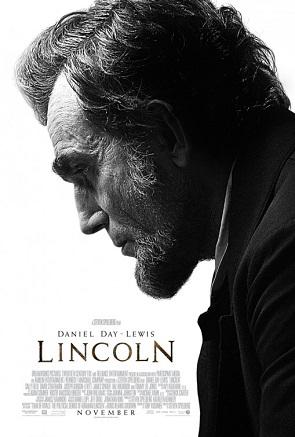
For our sixth wedding anniversary, Amanda and I saw Lincoln, more my idea than hers but it's really her fault, because after the decision was made to "go to the movies" she had nothing at the front of her mind or the tip of her tongue when the necessary specifics came to the fore. I've been wanting to see Lincoln for months and so was able to buzz in first.
You know the way with a movie you see after having heard from everyone how fabulous it is. Only, in my case, I've been disappointed so many times that I've learned to recalibrate my expectations, which gives the film a chance. So I'm not sure whether Lincoln is really good, or it maybe just benefitted from my reverse expectation psychology, but I liked it quite a lot. If it wins Best Picture, I will believe that it really was the best picture, and that it wasn't necessarily a thin year.
I know what I'd say if I was determined to be a contrarian. The movie purports to be historical and yet shows things that I'm pretty sure never happened. For example, I do not believe that debate in the House of Representatives in 1865 featured such colorful put-downs and all-around sportive language. I also doubt that, when the roll was called, the mediocrities upon whom the outcome depended paused cinematically before saying Aye or Nay. It's not a good sign, is it, when you notice the flourishes? The worst ones come with a large dollop of piety, as when the Confederate diplomats come north to negotiate for peace and are met by a regiment of black soldiers standing at dignified attention. Probably didn't happen, and, anyway, here in the blue states we already knew which side occupied the high ground.
On the other side of the ledger, Lincoln does not make the mistake of putting its titular subject on the pedestal where he usually sits in judgment on all us mortals. I'll mention just one small aspect of the plot's unwinding. I think I would have noticed, even if I hadn't been marking a marital anniversary, that the Lincolns' marriage is depicted in a manner that is uninspiring and probably realistic. The marriages of "great men" is an interesting topic. If their successes frequently do not extend to their careers as husbands, maybe that is because achieving what we call "greatness" is sometimes abetted by a certain one-sidedness that, viewed daily from close range, wears poorly. The movie indicates that, while Mary Todd was indeed a piece of work, the man who married her was not immune to this general rule.
The universal praise for the performances--Daniel Day Lewis as Lincoln, Sally Field as Mary Todd, Tommy Lee Jones as Thaddeus Stevens--will not be contradicted by me.
